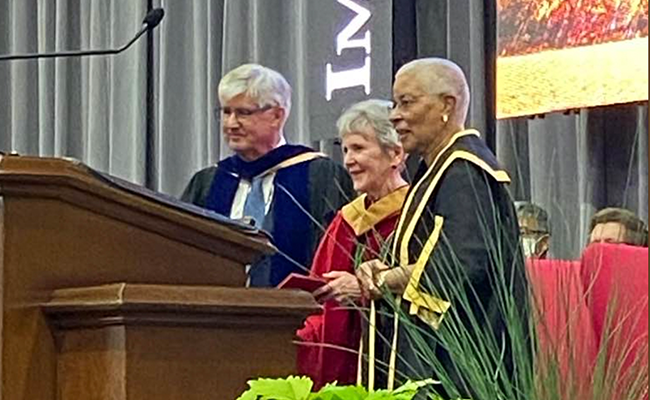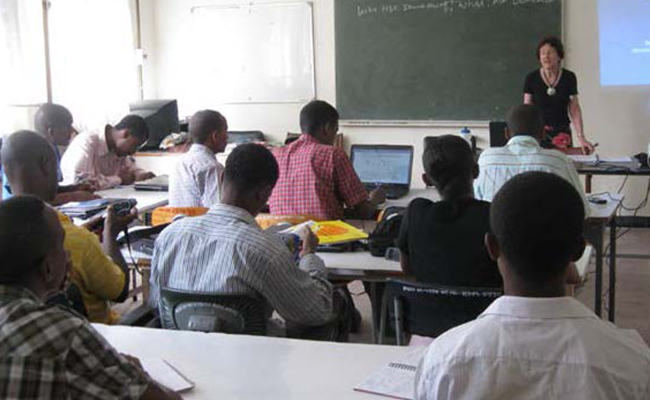 Professor Rosalind Gibson (centre) at the honorary doctorate award ceremony at the University of Geulph.
Professor Rosalind Gibson (centre) at the honorary doctorate award ceremony at the University of Geulph.
A three-year period in the 1960s, while working as a nutritionist in Ethiopia, initiated Emeritus Professor Rosalind Gibson's lifetime contribution to improving the lives of some of the world's most vulnerable populations.
At the time, Professor Gibson had just completed her master's in public health nutrition from the University of California, and during those three years in the Sub-Saharan African country her experience of people's impoverished living conditions highlighted the value of future work aimed at improving their nutritional wellbeing.
Based at the Ethio-Swedish Nutrition Unit in Addis Ababa, Professor Gibson was heavily involved in the development and production of a complementary fortified food called Fa-Fa for infants and young Ethiopian children. Fa-Fa was made from the local cereal teff, dried milk powder, legumes, and fortified with micro-nutrients. It remains in production today.
Over the course of her academic and professional career, Professor Gibson has returned regularly to Ethiopia and continued to develop and maintain strong connections there. Just recently, at the end of 2021, she taught a 10-week distance course on Nutritional Assessment to 40 PhD students from two Ethiopian universities.
 Professor Gibson has been involved in the development of the curriculum and teaching in the first MSc in Applied Human Nutrition in Ethiopia.
Professor Gibson has been involved in the development of the curriculum and teaching in the first MSc in Applied Human Nutrition in Ethiopia.
Fast-forward the clock several decades from that 1960s experience, and in June this year Professor Gibson travelled to Canada to receive an honorary doctorate from the University of Guelph, where she was based in the Division of Applied Human Nutrition from 1979 to 1995.
At the doctorate award ceremony, it was noted that Professor Gibson's achievements in nutrition research and mentorship have improved the lives of some of the world's most vulnerable populations. Over a period of more than 50 years in nutritional science, public health and policy, she has made significant contributions to knowledge of trace elements such as iron and zinc, including the health consequences of these deficiencies in low and middle-income countries in Africa and Southeast Asia. Professor Gibson's classic textbook, Principles of Nutritional Assessment, is used worldwide.
Reflecting on the honour of receiving the doctorate, Professor Gibson says: “It's been a real privilege to work in lower income countries and develop strong relationships with people in these countries.”
Prior to relocating to the University of Otago in 1996 as a professor, Professor Gibson and her husband Professor Ian Gibson had previously spent a year on sabbatical at Otago in 1986/87 – Rosalind in the Department of Human Nutrition and Ian in the Department of Geology.
“Ros's work in this field is clearly driven by her desire to make a difference to the health and wellbeing of mothers and children in underserved populations. Likewise, her commitment to capacity strengthening in the area of nutritional assessment in low-income countries has been unrelenting,” Professor Lisa Houghton.
When the couple moved to Dunedin in 1996, they decided that Ian would use his time assisting Rosalind with her teaching and advising in low-income countries.
Professor Gibson was attracted to Otago's Department of Human Nutrition as research on trace elements had been a central focus, and at the time the department was also in the process of setting up a World Health Organisation collaborating centre for nutrition in the Western Pacific region.
Over the last 20 years, Professor Gibson's work has included a focus on teaching and mentoring students in low and middle-income countries. She has been involved in the development of the curriculum and teaching in the first MSc in Applied Human Nutrition in Ethiopia and in teaching a course on Nutritional Assessment at the Southeast Asian Ministers of Education Organization Regional Centre for Food and Nutrition (SEAMEO RECFON) in Jakarta, Indonesia.
SEAMEO RECFON trains MSc and PhD students from across the region and also offers short courses on food and nutrition to health professionals. Consequently, Professor Gibson has been involved in the training of students and health professionals across the wider Asia region, including Indonesia, Thailand, Myanmar, Vietnam, Cambodia and Laos.
She has served as an expert adviser and consultant with leading international organisations, including the World Health Organisation and the United Nations Food and Agriculture Organisation and is also a Fellow of the Royal Society Te Apārangi and the American Society of Nutrition.
Long-time collaborator and head of Department of Human Nutrition, Professor Lisa Houghton says she's yet to meet another researcher like Professor Gibson, as her tireless passion and commitment to micronutrient research has been inspiring.
“Ros's work in this field is clearly driven by her desire to make a difference to the health and wellbeing of mothers and children in underserved populations. Likewise, her commitment to capacity strengthening in the area of nutritional assessment in low-income countries has been unrelenting,” Professor Houghton says.
“Both Ros and Ian have spent many years, in many countries, selflessly donating their time and expertise to support the hands-on training of local and regional nutritionists and academics. They have touched many lives and the benefits of their impact from research through to public health and policy have been far reaching and life-changing.”
In June this year, Professor Gibson also received the E. V. McCollum International Lectureship in Nutrition Award from the American Society for Nutrition. This bi-annual award encourages advancements in nutritional science and their application for improving the health and wellbeing of people worldwide and to commemorate the life and contributions of EV McCollum.
On receiving this award Professor Gibson discovered that the late Professor Marion Robinson from the University of Otago's Department of Human Nutrition was also a recipient in 1988.
“Marion's work with trace elements was one of the reasons I came to Otago originally, and as a leader in this field she made a huge contribution.
“To receive the same award as Marion really meant something to me, as it was acknowledgement that I was contributing to the quality of work the Department of Human Nutrition has become renowned for in helping the lives of others less fortunate than ourselves.”
- Kōrero by Guy Frederick, Communications Adviser Division of Sciences
